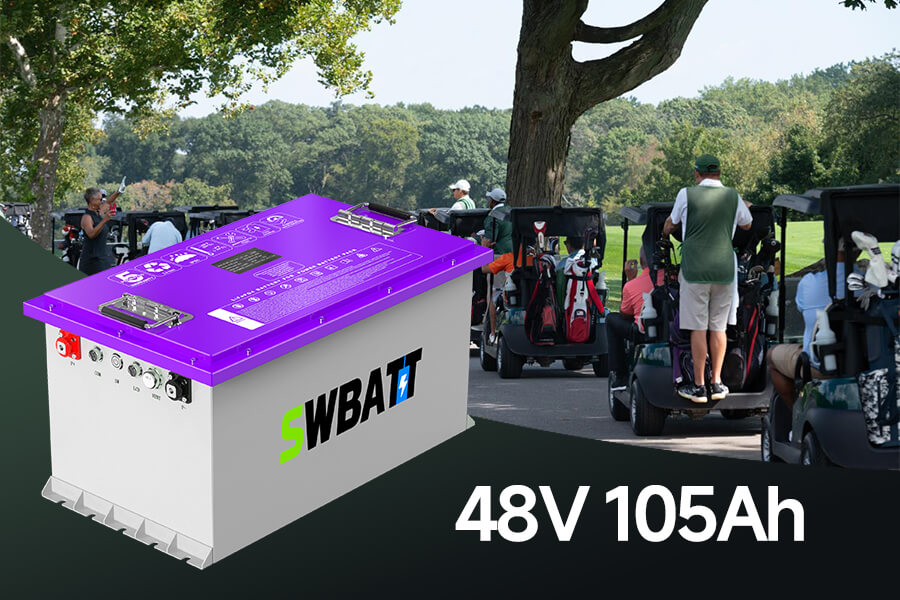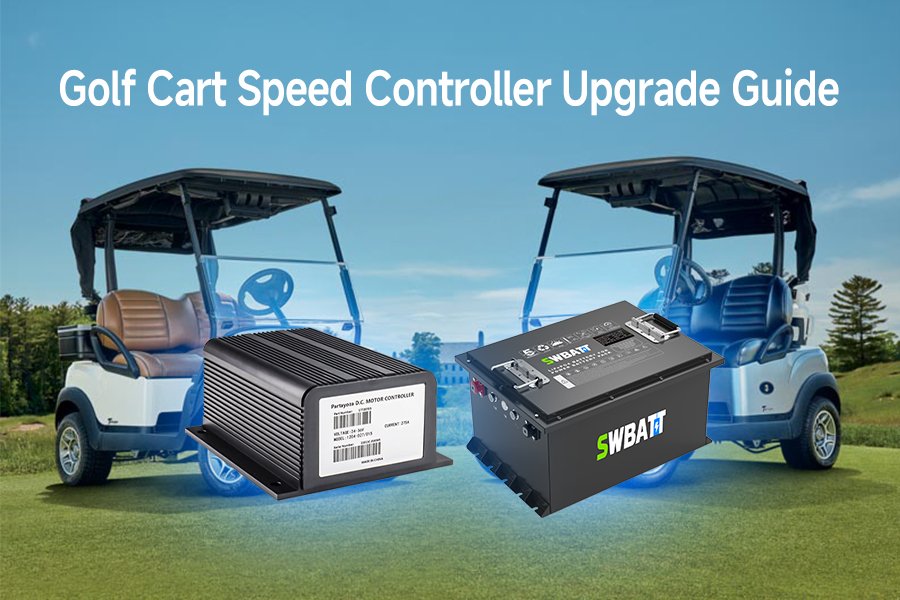A Club Car speed controller is a crucial electronic component in electric Club Car golf carts that regulates the motor’s speed and, consequently, the cart’s overall performance. It acts as the “brain” between the accelerator pedal and the motor, interpreting the driver’s input and delivering the appropriate amount of power. Understanding the function, types, and upgrade options for your golf cart speed controller, especially when considering a 48-volt golf cart controller or a transition to lithium batteries, is essential for fleet managers seeking to optimize performance, efficiency, and safety. This guide provides a comprehensive overview for B2B clients, including dealerships, golf course operators, and fleet maintenance professionals.
The Function of a Club Car Speed Controller: More Than Just Speed
Table of Contents
ToggleWhile the name suggests a focus solely on speed, the club car speed controller plays a much broader role in the operation of an electric golf cart. It’s not just about how fast the cart goes, but how it goes fast (and slow). Here’s a breakdown of its key functions:
- Speed Regulation: This is the primary function. The controller receives input from the accelerator pedal (which is essentially a potentiometer sending a variable voltage signal). The controller then adjusts the voltage and current supplied to the motor, controlling its rotational speed and, therefore, the cart’s speed.
- Torque Control: The controller doesn’t just manage speed; it also manages torque – the rotational force of the motor. This is crucial for hill climbing, carrying heavy loads, and accelerating from a standstill. A more sophisticated electric golf cart speed controller can provide more low-speed torque for better climbing ability.
- Regenerative Braking (in some models): Some advanced controllers, particularly those used with AC motors, offer regenerative Braking. When the driver releases the accelerator or applies the brakes, the motor acts as a generator, converting kinetic energy back into electrical energy and feeding it back into the battery. This extends the range and reduces wear on the brake pads.
- Safety Features: Controllers often incorporate safety features, such as:
- Over-Current Protection: Prevents damage to the motor and controller from excessive current draw.
- Over-Voltage Protection: Protects the system from voltage spikes.
- Under-Voltage Protection: Prevents the battery from being discharged too deeply, which can damage lead-acid batteries (and is managed by the BMS in lithium systems).
- Thermal Protection: Prevents overheating of the controller and motor.
- Direction Control (Forward/Reverse): The controller manages the direction of the motor’s rotation, allowing the cart to move forward and backward.
Types of Golf Cart Speed Controllers: Understanding Your Options
There are several types of golf cart speed controller technologies, each with its own characteristics:
- Series Controllers (Older Technology): These are older, less efficient controllers that use resistors to control motor speed. They are simple and inexpensive, but they waste energy as heat and offer less precise control. They are rarely found in modern Club Car vehicles.
- Sepex Controllers (Separately Excited): These are more advanced DC motor controllers that offer better control over speed and torque than series controllers. They are commonly found in many Club Car models. The motor has separate field and armature windings, allowing for independent control of each.
- AC Controllers: These are used with AC induction motors and offer the highest efficiency, performance, and features like regenerative braking. They are becoming increasingly common in newer, higher-end golf carts and are ideal for lithium battery systems.
Club Car Specific Controllers:
Club Car has used various controllers over the years, often manufactured by companies like Curtis Instruments. Some common examples include:
- Curtis 1204/1205: These are Sepex controllers commonly found in older Club Car DS and Precedent models.
- Curtis 1510/1515: More advanced Sepex controllers, offering improved performance and features.
- Curtis AC Controllers Offer the most control and are best used with Lithium batteries.
- Excel System Controller
- ERIC System Controller
It’s essential to identify the specific controller in your Club Car model before attempting any repairs, replacements, or upgrades. The controller’s model number is usually printed on a label attached to the unit.
Table 1: Golf Cart Speed Controller Types
| Controller Type | Motor Type | Efficiency | Control | Features | Typical Application |
| Series | DC | Low | Basic | Limited | Older, low-cost carts |
| Sepex (Separately Excited) | DC | Moderate | Good | More precise speed and torque control | Many Club Car models |
| AC | AC | High | Excellent | Regenerative braking, advanced features | High-performance, lithium carts |
Discover Advanced Lithium Battery Solutions
Explore SWBATT‘s innovative LifePO4 batteries for electric vehicles, energy storage, and more. Tailored solutions to meet your energy needs with efficiency and sustainability.

Upgrading Your Club Car Speed Controller: Benefits and Considerations
Upgrading your club car speed controller can offer several potential benefits:
- Increased Speed: Aftermarket controllers can often be programmed to allow for higher top speeds (though local regulations and safety concerns may limit this).
- Improved Torque: A more powerful controller can provide more torque for hill climbing and carrying heavier loads.
- Enhanced Efficiency: Newer controllers, especially AC controllers, are often more efficient, leading to longer runtimes.
- Regenerative Braking: Upgrading an AC controller can add regenerative braking, extend range, and reduce brake wear.
- Lithium Battery Compatibility: If you’re upgrading to lithium batteries, you’ll need a compatible controller, often an AC controller with specific programming for lithium battery management. This is a crucial point—a standard 48-volt golf cart controller designed for lead-acid batteries will pas work correctly with lithium batteries.
Considerations Before Upgrading:
- Compatibility: Ensure the new controller is compatible with your cart’s motor and other components.
- Warranty: Upgrading the controller may void the manufacturer’s warranty on your cart.
- Cost: High-performance controllers can be expensive.
- Installation: Installation can be complex and may require professional assistance.
- Motor: Upgrading the Controller may require upgrading the Motor.
Real-World Example:
Ocean View Golf Club upgraded the controllers in its fleet of older Club Car DS carts to newer Sepex controllers. They saw a noticeable improvement in hill-climbing ability and responsiveness, increasing customer satisfaction.
Troubleshooting Common Club Car Speed Controller Problems
Here are some common issues and troubleshooting steps:
Cart Runs Slowly or Weakly: Check battery voltage and connections. Low battery voltage is the most common cause.
- Inspect the accelerator pedal and its wiring.
- Test the motor (a qualified technician should perform this).
- The controller itself may be faulty.
- Cart Doesn’t Run at All: Check all wiring connections, including the main power cables and the controller connections.
- Check for blown fuses.
- Test the solenoid (a relay that connects the battery to the controller).
- The controller may be faulty.
- Jerky or Erratic Operation: Check the accelerator pedal for smooth operation.
- Inspect the motor brushes (in DC motors).
- The controller may be experiencing intermittent faults.
- Overheating: Ensure the controller has adequate ventilation.
- Check for excessive load on the cart.
- The controller may be faulty.
Important Note: Troubleshooting electrical components can be dangerous. If you are uncomfortable working with high-voltage systems, consult a qualified technician.
The Lithium Battery Connection: A Crucial Upgrade
As a lithium battery manufacturer, we must emphasize the critical link between lithium batteries and speed controllers. Suppose you are considering upgrading your Club Car fleet to lithium batteries (which we highly recommend for the reasons outlined in previous articles). In that case, you must also ensure your speed controller is compatible.
- Voltage Matching: While most Club Cars are 48V, and lead-acid and lithium systems can operate at this voltage, the charging and discharging characteristics differ vastly.
- BMS Communication: Lithium batteries have a Battery Management System (BMS) that protects the battery and optimizes performance. A compatible controller must be able to communicate with the BMS. Standard lead-acid controllers cannot do this.
- Charging Algorithm: Lithium batteries require a specific charging algorithm (often constant current/constant voltage) different from those used for lead-acid batteries.
Using a lead-acid controller with lithium batteries will, at best, result in poor performance and reduced battery lifespan. At worst, it can lead to severe damage to the battery and even create a fire hazard.
Frequently Asked Questions (FAQs)
Q1: Can I increase the speed of my Club Car by simply replacing the controller?
A : Possibly. Some aftermarket controllers are designed for higher speeds. However, there are limits to how much speed you can safely achieve, and other components (like the motor) may also need to be upgraded. Also, be aware of local regulations regarding golf cart speed limits.
Q2: What is the lifespan of a golf cart speed controller?
A : The lifespan can vary greatly depending on the type of controller, usage conditions, and maintenance. A well-maintained controller can last for many years, but failures are possible.
Q3: How do I know if my Club Car speed controller is terrible?
A : Symptoms of a bad controller include the cart not running at all, running weakly, jerky operation, or overheating. Proper diagnosis often requires specialized tools and knowledge. Consult a qualified technician if you suspect a problem.
Ready to optimize your Club Car fleet’s performance and efficiency with a speed controller upgrade or a transition to lithium power? Contact our team of experts today for a personalized consultation and a custom quote. We’ll help you choose the right controller and battery system for your needs and budget.



